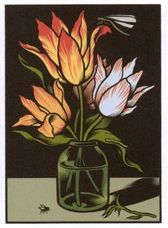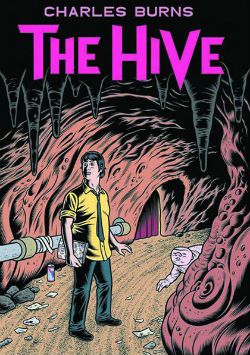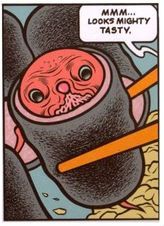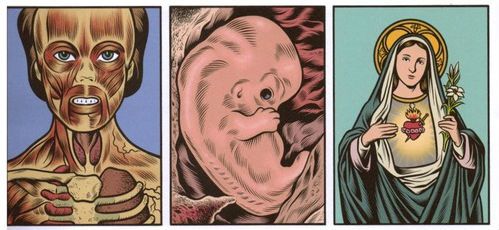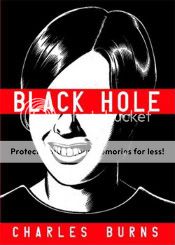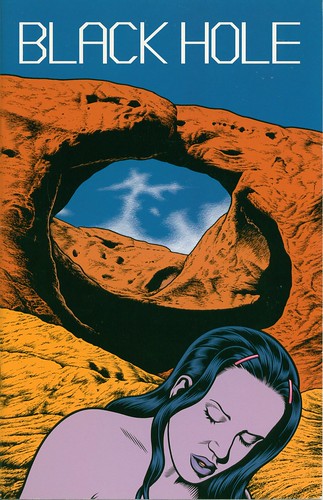
 Dick Hyacinth here. In case you've forgotten, Sean and I both reviewed Black Hole for our first posts here at the Savage Critics (Sean's post, my post). It seemed kind of silly to have two reviews of a four year old (or twelve year old, depending on how you look at it) comic on the site without something or another to tie to the two together. So over the course of a week of emailing, Sean and I discussed Black Hole and each other's reviews. We examine gender, genre, eroticism, the horrors of adolescence, and a host of other issues after the break.
Dick Hyacinth here. In case you've forgotten, Sean and I both reviewed Black Hole for our first posts here at the Savage Critics (Sean's post, my post). It seemed kind of silly to have two reviews of a four year old (or twelve year old, depending on how you look at it) comic on the site without something or another to tie to the two together. So over the course of a week of emailing, Sean and I discussed Black Hole and each other's reviews. We examine gender, genre, eroticism, the horrors of adolescence, and a host of other issues after the break.
DICK: One thing I didn't really get to talk a lot about in my review was the character of Eliza. I think she's interesting in that she isn't really like any of the other characters; she seems to occupy liminal space in several respects. While Keith, Chris, Rob, Dave, and almost all the other characters are still in high school, Eliza apparently is not. But her infection places her at least partly in the world of teenagers. Sexually, her tail is something of a phallic object. When she and Keith have sex, it writhes around in his hand as he grips it tightly. She has a great deal more freedom than the characters who still live with their parents or are confined to the woods, but as you mention in your review, she's very much haunted by her past.
It's also interesting that Eliza seems to be the most distinctive looking of Black Hole's characters. I'm a great admirer of Burns' art, but I think it's safe to say most of his characters look like they come from his repertory company (to borrow a concept from Eddie Campbell). Eliza is different; there's something oddly specific about her. Other characters' expressions are reminiscent of those one would see in horror or romance comics (the latter being particularly true for Chris), but Eliza's facial expressions are much more naturalistic; they look photo referenced. Especially that first panel she appears in--she looks so different from all the other characters, it just pops off the page.
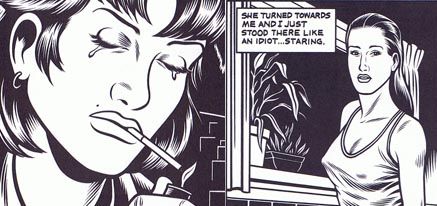
The other thing I can't quite figure out about Eliza--and this might speak to my own ignorance--is what we're to make of that drawing which seems to depict Keith, gagged and bound to a tree in the woods. On one level, we can take it as a purely symbolic thing. At the end of the book, she draws a picture of Keith soaring above the other bug victims, suggesting escape from his problems (and adolescence, maybe). The value of that symbol is increased if you consider the woods as a symbol of stagnation. In this interpretation, the forest is essentially imprisoning Keith by preventing him from escaping his adolescence; the later picture correlates freedom with movement beyond the woods. In this sense, the pictures reflect the events going on in the book rather unambiguously.
But Burns blunts this positive interpretation in a couple of ways. First, Eliza seems somewhat embarrassed by the drawing of Escaping Keith. It's much more optimistic than her other work; she calls it "corny." One almost gets the sense that she's telling Keith what he wants to hear, rather than expressing her true thoughts about their new situation. The other, more troubling thing is the nature of the Bound Keith picture. First of all, it's something she drew before she knew him--making it oddly prescient. Secondly, her flashback to sleeping in the woods as a runaway indicates that she actually saw this scene in reality (in which case it's not actually supposed to be Keith in the drawing after all). There's no indication of who the bound figure is or who is responsible for his condition. You might suppose that Eliza was camping in the outcast colony, and that Dave and Rick were responsible for the incident, but Burns leaves it open enough that this is interpretation is more speculative than definitive.
For Keith, I think Eliza represents the allure and danger of adulthood and the future in general. Eliza's mystery and experience make her more attractive than the girls his own age. At the same time, he hardly knows her; there's no particular reason to think that they will have a happy future together. She seems more aware of this than Keith.
What's your take on Eliza?
SEAN: Eliza is an interesting case to me, because to be honest, when I think of her I think of sex. I think that Tom Spurgeon did a Five for Friday one time about comics characters you find attractive, and she was at the top of my list; to be honest, after her there really didn't need to be a list. I know that admitting that sort of thing is seen as creepy, especially if you're a dude, especially if you're a dude who also reads and likes superhero comics, but I've sort of been making an effort lately to talk about arousing art in the context of being aroused by it, reclaiming that space as valid, and that's where I'm at with Eliza--something about her triggers my lizard brain (no pun intended). Like I mentioned in my review, this is probably in part due to her resemblance to a girl I knew IRL, but that's not all of it by a long shot. For starters, you're right, she's much more realistically drawn than the rest of the gang, including (for the most apples-to-apples comparison) Chris. She pops against the other characters. And Burns takes advantage of how the added level of detail and nuance to milk very specific facial expressions and body language: being really fucking high, being surprised, being dazed, being lonely, being happy about something simple like an ice pop or sandwich or bumping into a friend in the grocery store.
She's also older and freer, as you note, at least in the sense that would register with Keith, i.e. she lives outside the sphere of parents and school. As we learn, she's actually less free than Keith, Chris, and the other kids, since she's sort of in thrall to these college-kid drug dealers and her own history of abuse. But there's a glamour to her ability to walk around a house half-naked, spending all her time getting baked and making art. "It's all right there," as Keith says--she's created a life out of articulating, however inarticulately, the feelings he has to keep bottled inside. What I like about this is that her sophistication, her devotion to her work, and her talent are all part of what makes her sexually attractive to Keith. I feel like that's the sort of thing you see more when the shoe's on the other foot, and you're telling a story about a male artist and his female admirer/muse. I don't go in for playing spot the phallus all that often, but it seems fair to point out as you do that she's the character with the vestigial dick--yet she's never less than breathtakingly (literally!) feminine. Here, it's the guy who's blown away by the girl's artistic gifts and commitment to them. (Creative void my ass, Dave Sim!) And it's not just some intellectualized admiration, it's a turn-on.
Indeed, Keith actually becomes Eliza's muse there at the end. I believe her earlier drawings of a boy tied to a tree were meant to represent a real-life incident she witnessed in the woods involving not Keith, but some other victim of Dave and Rick the Dick's depredations, but there's obviously no question who her drawing at the end is of. Because I'm a cockeyed optimist (LOL), I like to believe this represents some kind of maturation for Eliza. Her past subject matter was uniformly sinister; perhaps this liberating image represents a turned corner in terms of what she expects from life and herself. Moreover, I also like to believe that Keith and Eliza have a better than even shot at making a go of things. Surely there's a reason their situation is so sharply contrasted with Chris's at the end, seeming so much more comforting and hopeful. Again, this is personal experience talking, but I really did meet my future wife in high school and begin dating her back then. We had our ups and downs, but we made it work, knowing each other barely at all at first, connected by physical attraction and mutual admiration and intrigue. So to Keith and Eliza, I say, Yes we can!
But that raises a question perhaps you can take a crack at for me: Why do you think Chris's story ends on such a down note? She seems to have a lot more going for her than Rob, in several departments: Brains, looks, social proficiency. What are we to make about the magnitude of the personal tragedy that befalls her, her inability to process it (contrast it with Eliza shaking off her sexual assault, which maybe isn't a whole lot better a way to process trauma but she at least has picked herself up and moved on), and her ultimate near-suicidal state?
DICK: Chris' fate is something that I've struggled with as well, partly because of a knee-jerk reaction to a story that ends with the male protagonist moving forward and the femal protagonist regressing. At first glance, it doesn't speak well to the book's gender politics, but that's a rather shallow reading (and thankfully one I haven't heard come up very often--maybe those likely to offer this response aren't reading books like Black Hole?).
To understand what happens to Chris, we obviously have to go back to her relationship with Rob. As I said in my review, Rob's death leaves Chris feeling like she has nothing to live for. The death of someone so close is, of course, a tragic thing, but the severity of her response speaks to what you said about the teenage characters' overreactions to everything, good or bad. Part of being an adult is accepting the idea that people are going to die; we never really get over the deaths of those closest to us, but we (hopefully) eventually figure out how to go on living. When she buries that picture of Chris, you do kind of get the sense that Chris has accepted that she has to move on with her life. That's the silver lining to her ending; I guess you could interpret her retreat to the womb as temporary, a safe shelter in which she can heal her wounds then move on.
The Chris-Rob dynamic also sheds a little light on Keith's relationship to Eliza. There's a little bit of a counterfactual in Chris' reaction to Rob's death: what would have happened to Keith without Eliza in his life? Would he have survived, or would he have met a fate similar to Rob or Dave? I don't think Burns is saying anything as facile as "surviving adolescence requires good friends (platonic or otherwise)," though I do think that anyone who's made it through to adulthood will agree that good friends make the teenage years a lot easier.
On the other hand, we're all aware that those who are popular have an easier time of adolescence. If we think of the bug as the supreme determinant of who's popular and who's not, I think it sheds some light on Chris' situation. She's popular, studious, and attractive, but all that evaporates in the span of about a week. It's the sort of sudden reversal of fortune that teenagers undergo all the time. The bug isn't that different from other adolescent traumas like pregnancy, substance abuse, parents' divorce, or the realization that one is gay. Those are all legitmate problems, and teenagers haven't developed the emotional mechanisms to deal with them. Which is why it's so important to have some external support, be it from friends, SOs, family, teachers, or whatever.
Again, I think Chris' burial of the photo and explicit rejection of suicide point to an ending which, while not as hopeful as Keith's, at least suggests that she will try to deal with the traumas she's encountered. I think the difference between her and Eliza may well be time; she hasn't had as long to process what happened, and seems to be in the middle of her potential recovery as the book ends. But, to again cite your review, recovery is a process, not an event. There will be setbacks along the way, but there are plenty of things worth living for. Eliza is fortunate to have Keith (who, in turn, is fortunate to have Eliza). Maybe Chris really does need her parents.
And that brings me to another point about Black Hole: the startling absence of adults. You mentioned before that most of the characters dismiss adults as incapable of understanding their problems. Is there anything more to it than that?
SEAN: Before I tackle the parent angle, I feel I should add that as a horror enthusiast, I have no problem with serving up extremely bleak endings for your protagonists. It satisfies some nihilistic part of myself to see a fundamentally together person get broken down in a story like this, so even if there were no more "reason" for Chris to end up in a darker place than Rob than "because it's disturbing," I'd be fine with that. I think this is even reflected in Burns's visual treatment of Chris, who occasionally looks ripped straight from a romance comic--I'm thinking in particular of the shot after she and Rob first have sex and she realizes he has the bug; by the end of the story you've seen her all dirty and hairy and practically passed out naked in a stranger's bathtub. And this in turn reflects Keith's realization that he's been in love with a figment of his imagination, with an idealized girl who in no way resembles the very real girl with very real problems that actually exists. Of course, you could argue that he then goes and does the exact same thing with Eliza, but I think you can see his enthusiasm for her art, and his willingness to talk her through the traumas she's faced, as signs that he loves Eliza as she is, not as he imagines her to be.
Meanwhile, I'm glad to see you reject the gender-politics read of the book, which as you say would be a pretty shallow way to approach it. My favorite definition of feminism, and certainly the way I try to live it, is that it's the radical proposition that women are human beings. No more, no less! The reason that strikes me in the context of Black Hole is because I feel that this is what Burns is trying to say regarding sex: It's not the be-all and end-all serving of awesomesauce that teens (particularly teen guys) think of it as, nor is it necessarily a sqaulid and dangerous recipe for disaster. It's a powerful, ideally pleasurable, physical mode of interaction between two people, no more, no less. It can be dangerous for you, physically and emotionally--obviously that's the whole point of the teen plague idea, and you see it manifested in less fanciful ways with Rob and his ex, Keith's friends, even Eliza's rape. But when you look at the sex scenes Burns actually chooses to depict, they seem to be a lot of fun for the participants, and to bring them closer together emotionally. I've always found Black Hole's even-handed, if warts-and-all, approach to teen sex refreshing.
Back to Chris and adults: I think you're right to point out that there are hints toward the end there that she may be preparing to truly process her grief and loss and move on, and to me one of the biggest signs in that regard is her acknowledgement (even if it leads to a rejection, at least for now) of the potential for adults--the kindly woman on the beach, her parents--to help her solve her problems. Prior to that, adults throughout the book are uniformly thought of as sources of embarrassment, conflict, and oppression, when they're thought of at all; most of the time they don't even register. Now, I think that's a slight exaggeration of how kids live--I know I thought of my parents and their reactions to things I did pretty constantly, even if in certain cases it didn't affect how I behaved--but it's emotionally true in the sense that kids, particularly troubled kids like the ones in the book, tend not to feel that grown-ups can offer any succor or insight into the problems that afflict them emotionally and psychologically. But even more importantly to the book--here, perhaps, is the "more to it than that" you asked about--the absence of parents just makes everything feel that much more insular and claustrophobic, really a must to pull off a convincingly frightening horror story. It's the plot-mechanic equivalent of going so heavy on the blacks in the visual department, as you pointed out. The presence of grown-ups would not only create opportunities for the characters to escape the worst aspects of their situation, it would also serve to remind them on some level that you can grow up and get out, that things do get better as I've said. For the story to work, for the story to be the story it is, those options can't exist.
Hmm, one thing I'm noticing as I discuss the book is that I'm sort of splitting my time between talking about it in genre terms, as horror or as erotica, and in your basic non-genre human-drama terms. Do you feel it functions effectively in both worlds?
DICK: I've never really viewed Black Hole as a type of erotica, mostly because it doesn't work that way for me at all. So I don't really have much to say about that. As horror: I think that's an interesting question, and kind of relates to something Jeff mentioned in the comments to my review. Jeff wondered if the gorgeous art in Black Hole might make it a little more accessible; I would say the horror aspects to the book might function similarly. I haven't read everything Burns ever did, and it's been a while since I've read anything by him other than Black Hole. But my memory is that Burns tends to use horror trappings as a way to enhance larger themes in his other work. The Big Baby work, of course, deals with a character on the cusp of puberty, but I remember it being pretty similar thematically (though not nearly as rich as Black Hole).
Mostly, though, I've always thought of Burns as an excellent horror artist, but not really a horror cartoonist, so to speak. I might have a narrow view of horror, but his comics don't work on that level for me. The mouth in Rob's throat is an unsettling image (actually, that kind of makes Rob another liminal character--he possesses both vagina and penis), as are the tadpole growths on Keith's side, but they're not the kind of images that really stick in my brain like that underwater scene at the begining of Inferno (to use a horror film I really like as an example). And I was never scared by anything in Black Hole, at least not in a horror genre kind of sense. For me, Black Hole inspires dread rather than fear.
It would be interesting to consider his work in the context of other cartoonists of a similar stripe: Mat Brinkman, Josh Simmons, Tom Neely, early Chester Brown, Richard Sala, maybe even Rory Hayes, and certainly a bunch of other people I'm surely forgetting. I think Neely, who works in a very attractive EC Segar-influenced style, probably comes the closest to doing what Burns does. I'd go on, but we've already reached epic proportions. And you're the horror expert, so it's only fair to give you the final word on this. Does it work as horror for you, and how does it stack up to other horror comix (for lack of a better term)?
SEAN: So, nothing sexy in Black Hole for Dick Hyacinth, huh? Well now I feel like a bit of a freak myself. Aw, who am I kidding: Own it, Collins! I can't help but feel that sex scenes involving attractive people drawn attractively enjoying themselves having sex are intended to be erotic, regardless of those scenes' surroundings or their ultimate outcome in the narrative. Indeed I think that's part of Black Hole's power: Its ability to titillate and repulse in rapid succession, or even simultaneously. When people liken the book to the work of David Lynch, I'm pretty sure they don't just mean that both Black Hole and Twin Peaks take place in the Pacific Northwest, you know?
Now for the horror. You've actually got a leg up on me in terms of placing Black Hole within Burns's oeuvre, because this is literally the only book of his (other than that little photography collection D&Q put out a couple years ago) that I've read. Why? Because his past work fails my "is it visually appealing on a cursory flip-through surface level?" While he's always been almost ridiculously talented as a craftsman, his '50s and '60s trash-culture/Famous Monsters of Filmland aesthetic previous to Black Hole just doesn't speak to me much. Call it the narcissism of small differences if you will, but that whole tradition of combining horror iconography with outsider/alternative music and culture--you can also see it in psychobilly, John Waters, even Lynch's Wild at Heart--is just a few steps removed from my own similar aesthetic journey, but they're big steps, I guess.
So in the sense that Black Hole's brand of horror is more straightforward, darker, more sexual, less comical, more "realistic," then yes, that gives me more of an in. And I'd imagine that's true for other horror-interested readers as well. I've certainly tried to sell Black Hole to other people as The Greatest Horror Comic Ever Made, the same way people sell Watchmen as The Greatest Superhero Comic Ever Made, even though in both cases these books have myriad other concerns beyond just being a good horror comic or a good superhero comic. Granted, I have a pretty catholic definition of horror (Barton Fink, Eyes Wide Shut, Heavenly Creatures), one that definitely weighs dread pretty evenly alongside fright. But the list of horror-ish comics creators you cite--I'd throw Junji Ito in there quite comfortably, by the way--sort of makes this point for me. You're not including, say, Steve Niles, or even Robert Kirkman, whose The Walking Dead I actually quite like; you're talking about alternative cartoonists whose work doesn't "look scary" the way all the "horror comics" that clog up Previews do, and who in some cases never considered their work to be horror (Tom Neely has told me that until he saw me describe The Blot as a horror comic, the thought had never occurred to him), but whose work has the power to discomfit, disgust, disturb, and unnerve us. Jump-scares may be few and far between, but reading those comics has a sort of darkening effect on me, like turning some sort of psychological dimmer-switch way down low. Everything's a little creepier and more uncomfortable after I'm finished reading. Black Hole does that better than any other comic I've read, even as its lovely art and sympathetically messed-up characters keep inviting me back to start the process over again.
